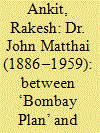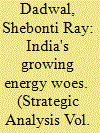|
|
|
Sort Order |
|
|
|
Items / Page
|
|
|
|
|
|
|
| Srl | Item |
| 1 |
ID:
118867


|
|
|
| 2 |
ID:
171864


|
|
|
|
|
| Summary/Abstract |
Dr John Matthai held key ministerial offices in New Delhi during a time of transition from pre- to post-independent India. He was Finance Minister twice (1946, 1948–50) and, in between, held the portfolios of Industry & Supply and Railway & Transport. Matthai had been an academic in Madras, an administrator with the central government and an economist in Bombay with the Tata group. His wide expertise and diverse experience brought him a range of opportunities in those partisan times, including as Chairman of Taxation Enquiry Committee (1953) and State Bank of India (1955). Matthai’s ministerial appointments were unusual, his administrative challenges were unfavourable and his exit from government unexpected. In this article, I argue that his short-lived and scattered ministerial life and the record he left of it provides a unique vantage from which to view the interim times of 1946–1950 in India, with their paradigm of ‘continuity and change’.
|
|
|
|
|
|
|
|
|
|
|
|
|
|
|
|
| 3 |
ID:
115899


|
|
|
| 4 |
ID:
090307


|
|
|
|
|
| Publication |
2009.
|
| Summary/Abstract |
This essay examines the Indias' political leadership's romantic engagement with the idea of developmental planning in post-colonial India between 1947 and 1960. It looks at the experience of planning in India between 1947 and 1960. It explores some of the early ideas about developmental planning and the setting up of the Planning Commission in March 1950. Although there was widespread acceptance of the need for planning there was little consensus on the kind of planning that was required, or how it should be carried out. This essay examines attempts, which were made to institutionalise the planning idea. It looks at the heady ascent of the Planning Commission as the pre-eminent economic decision-making body in Independent India and the debates and contentions that took place in the early years of its formation. It argues that the 1956 foreign exchange crisis marked a climactic moment for planning. Thereafter, as far as economic decision-making was concerned, the locus of power shifted from the Planning Commission to other governmental agencies and the developmental planning process itself came to be over-shadowed by pragmatic economic management pursued by official agencies. Thus, in overall terms, developmental planning failed to establish strong institutional foundations in independent India and, in all this, the experience of the 1950s was formative.
|
|
|
|
|
|
|
|
|
|
|
|
|
|
|
|
| 5 |
ID:
142843


|
|
|
|
|
| Summary/Abstract |
On 1 January 2015, India's 64-year-old apex policy-making body, the Planning Commission, was replaced by a new institution, the National Institution for Transforming India (NITI) Aayog. While it is still too early to assess the NITI Aayog's impact on India's complex policy landscape, or the full extent of its social and political implications, the emerging architecture of the new institution provides valuable insights into the Modi government's economic policy priorities and preferred style of governance. My paper argues that, contrary to the government's claims that the NITI Aayog will spur innovative thinking by objective ‘experts’ and promote ‘co-operative federalism’ by enhancing the voice and influence of the states, the new institution is being crafted to enlarge the power of the executive government and the prime minister. The elimination of the Planning Commission, a once-powerful advocate of public investment-led development, and of the National Development Council, an important platform for states to work together towards common goals, has set the stage for what the NITI Aayog will turn out to be. Developments to watch for include the NITI Aayog's role in diminishing horizontal institutional accountability; in reducing the ability of state governments to negotiate with the central government; and in narrowing intellectual diversity within elite policy circles.
|
|
|
|
|
|
|
|
|
|
|
|
|
|
|
|
| 6 |
ID:
143468


|
|
|
|
|
| Publication |
New Delhi, National Book Trust, 1983.
|
| Description |
v, 90p.pbk
|
|
|
|
|
|
|
|
|
|
|
|
Copies: C:1/I:0,R:0,Q:0
Circulation
| Accession# | Call# | Current Location | Status | Policy | Location |
| 029228 | 338.954/MAH 029228 | Main | On Shelf | General | |
|
|
|
|
| 7 |
ID:
152457


|
|
|
|
|
| Summary/Abstract |
This article critically assesses the impact of the Planning Commission on center-state relations in India. It argues that the Planning Commission had a centralizing effect due to its role in overseeing five year and annual planning, its contribution to designing and overseeing Centrally Sponsored Schemes (CSS), and its involvement in discretionary grant-making. Central policy priorities and inter-state disagreements prevented the Planning Commission from acquiring the role of a shared rule institution, capable of offsetting the centralizing implications of the aforementioned policies. The article then speculates on what prompted the recent replacement of the Planning Commission with the NITI Aayog and what this may mean for shared rule and the nature of collaborative federalism in India more in general.
|
|
|
|
|
|
|
|
|
|
|
|
|
|
|
|
|
|
|
|
|